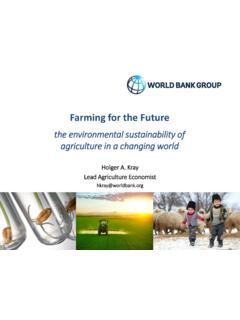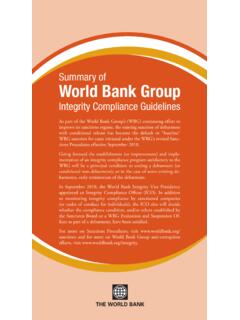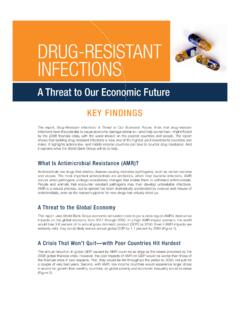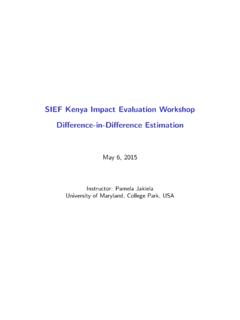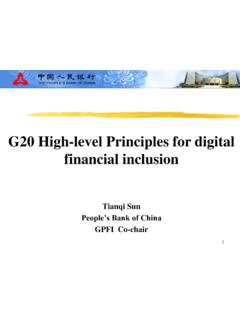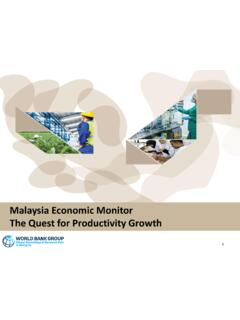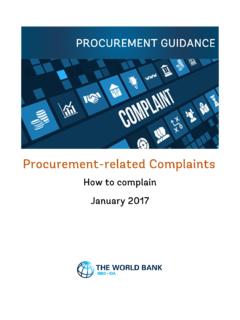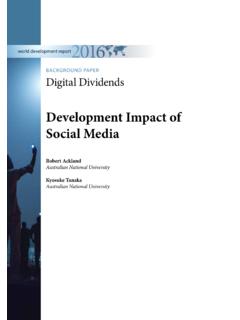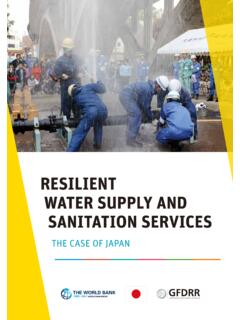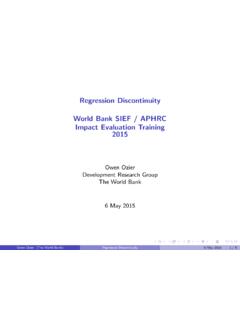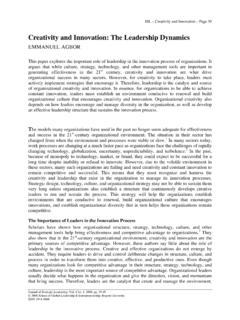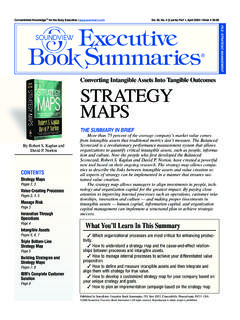Transcription of THE HUMAN CAPITAL PROJECT - pubdocs.worldbank.org
1 THE. HUMAN . CAPITAL . PROJECT . WILL ACCELERATE. MORE AND BETTER. INVESTMENTS. IN PEOPLE GLOBALLY. 1. HUMAN CAPITAL Index: Make the case for investment in the HUMAN CAPITAL of the next generation. 2. Measurement & Research: Improve measurement and research and provide analysis to support investments in HUMAN CAPITAL formation. 3. Country engagement: Support Early Adopters, and ultimately all countries, to prepare national strategies that accelerate progress on HUMAN CAPITAL . 2. HUMAN . CAPITAL . INDEX. 3. HUMAN Three ingredients reflect building blocks CAPITAL of the next generation's HUMAN CAPITAL : INDEX: THE STORY SURVIVAL. Will children born today survive How much HUMAN CAPITAL can to school age? a child born today expect to acquire by age 18, given the school .
2 Risks to poor health and poor How much school will they complete education that prevail in the country where she was born? and how much will they learn? HEALTH. Will they leave school in good health, ready for further learning and/or work? 4. HUMAN CAPITAL INDEX: DISTANCE TO FRONTIER. SURVIVAL school HEALTH HCI. Children who Contribution Contribution Productivity don't survive of quality- of health (adult of a future don't grow up to adjusted years of survival rate and worker become future workers x school to productivity of x stunting) to productivity of = (relative to benchmark of future workers future workers complete education and full health). 5. HUMAN HUMAN CAPITAL INDEX. CAPITAL . INDEX: COVERAGE. HCI covers over 150. countries as of Sept 10, up from 141 mid-June 6.
3 HUMAN CAPITAL INDEX &. SURVIVAL school HEALTH. Under-5 mortality Quality adjusted Improving adult The components links to SDG target school years links survival rate by of the HUMAN to SDG target reducing causes of premature mortality CAPITAL Index links to SDG target have close links with the SDGs Stunting links to SDG target 7. MEASUREMENT. & RESEARCH. 8. MEASUREMENT & RESEARCH AGENDA. The main objectives of the measurement effort are: (i) to provide policymakers with more information on how to invest in HUMAN CAPITAL , and (ii) to create public demand for HUMAN CAPITAL investments. As data coverage improves and scope of the Index expands, future versions of the Index will aim to cover early childhood and post- school learning (higher education and on-the-job) and health morbidities related to productivity (communicable diseases, non-communicable diseases, mental health), etc.
4 The measurement and research work will also: respond to demand for more measurement at sub-national levels and to deepen understanding of inequalities ( geographic location, gender, disability) underlying HCI outcomes. Better understand the process of HUMAN CAPITAL accumulation. Assess the quality of delivery systems in each country. 9. HUMAN CAPITAL PROJECT : FROM METRICS TO POLICIES. HUMAN CAPITAL INDEX (HCI) HCP DELIVERABLES. OUTCOMES. QUALITY-ADJUSTED 1. Filling learning data gaps SURVIVAL HEALTH 2. Data harmonization YEARS OF school . Malnutrition Lack of access to quality Liquidity Constraints 1. Scaling up measurement healthcare (MELQO, SDI). Poor birth outcomes Poor health 2. Unpacking contributing NG FACTORS.. CONTRIBUTI. Low birth weight Lack of information factors Non-breastfed children Unskilled and unmotivated 3.
5 Adaptive and Poor hygiene practices teachers experimental learning Unsafe drinking water and food Ineffective school Overcrowded conditions management Universal Health Coverage (UHC) school quality (SDI) 1. Scaling up systems Health service quality (SDI) Enabling policy environment benchmarking LEVERS. POLICY. Coverage of social safety nets (ASPIRE) in education (SABER) 2. Contextualization 3. Generating country- specific evidence 10. COUNTRY. ENGAGEMENT. 11. PROGRESS ON EARLY ADOPTERS . Early Adopters are a group of close to 30 countries that have expressed advance interest in the HUMAN CAPITAL PROJECT . These countries span various regions and income levels. They are: Working with the WBG through nominated focal points in government. Elevating the HUMAN CAPITAL policy dialogue across sectors.
6 Identifying national priorities for accelerating progress on HUMAN CAPITAL , based on each country's own development plans. Several countries have already drafted these priorities. Lessons learned will inform future expansion of the PROJECT . Early adopters will launch a community of practice on HUMAN CAPITAL . We will work with all countries in a phased manner after the Bali Annual Meetings to support implementation. 12. EARLY. Armenia Morocco ADOPTERS: Bhutan Pakistan 28 CONFIRMED Costa Rica Papua New Guinea AS OF Egypt Peru SEPTEMBER 18 Ethiopia Philippines Georgia Poland Indonesia Rwanda Iraq Saudi Arabia Jordan Senegal Kenya Sierra Leone Kuwait Tunisia Lesotho Ukraine Lebanon United Arab Emirates Malawi Uzbekistan 13. EARLY ADOPTERS. WILL HELP DEVELOP Leverage resources and increase spending efficiency Analyse public spending & financing gaps A PACKAGE OF Mobilize domestic resources POLICIES AND Mobilize private sector demand and resources INTERVENTIONS TO.
7 ACCELERATE HUMAN Align policies with results-focused investments Develop results-focused policies CAPITAL OUTCOMES Design for optimal distributional impact Address measurement and analytical gaps Develop clear measures of HUMAN CAPITAL outcomes learning, ECD. Identify relevant policy levers expanding Service Delivery Indicator surveys 14. BEYOND BALI: POSSIBLE WAYS. TO SUSTAIN MOMENTUM. PROGRAM DESCRIPTION. Community of Practice Convenes Early Adopters, virtually and physically, to 1) learn about potential HUMAN CAPITAL -related solutions, 2) exchange ideas/lesson learned with other Early Adopters Twinning Pairs Early Adopters with countries that are similar but more mature on HUMAN CAPITAL Outcomes ( , Ukraine paired with Poland). HUMAN CAPITAL TechEmerge Supports Early Adopters connect with technological solutions that can enhance service delivery (builds off Innovation Fair at Annual Meetings in Bali).
8 Staff Exchange Shares expertise between Early Adopters to build capacity, exchange knowledge, and develop a culture of dialogue and cooperation (similar to Twinning but targets individuals). HUMAN CAPITAL Fellows Identifies and helps develop young local professionals in Early Adopters who can support governments and World Bank teams in scaling up cross-sectoral HUMAN CAPITAL initiatives Social Accountability Offers material for countries to customize as part of a broad public campaign for HUMAN CAPITAL in support of HUMAN CAPITAL development ( , citizen perception surveys on right to and delivery of social services, cartoons for nutrition, etc.). 15. #InvestinPeople 16.
